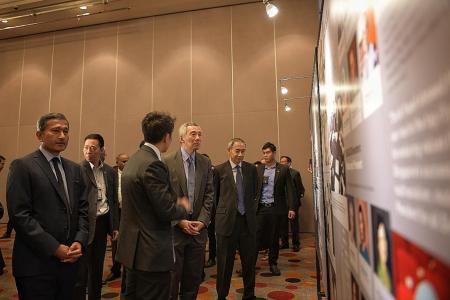Asean must stand united amid 'tidal pulls' in changing world: PM Lee
Changing power structures in the region should not lead to fault lines within Asean, says PM Lee
Asean has to get used to new internal dynamics as each member - to a different degree - feels the influence of burgeoning regional powers, especially China and India, Prime Minister Lee Hsien Loong said yesterday.
But this must not lead to division, he said.
"We must accept the reality of these tidal pulls, without allowing them to lead to fault lines forming within the Asean group," he said.
New powers, especially China and India, are growing in strength and influence, creating new opportunities, he noted.
"Countries have to take into account the policies and interests of new powers, while maintaining their traditional political and economic ties", he added.
The political mood in the US may have changed but Asean hopes the world's biggest economy and region's security anchor remains active in South-east Asia.
"In this shifting environment, it is important that Asean works actively to maintain its centrality and relevance," the Prime Minister told about 500 people, including diplomats and students, at a lecture marking the 50th anniversary of think-tank ISEAS - Yusof Ishak Institute.
He noted that there is nothing to prevent other groupings or projects - such as China's Belt and Road Initiative - from being launched. So while each Asean member has domestic issues to manage, a unified front is key.
PM Lee called on governments to invest political capital in the Asean project and to make a conscious effort to think regionally, not just nationally.
For example, the Regional Comprehensive Economic Partnership, which comprises Asean and its six free trade agreement partners; and the Asean-European Union Comprehensive Air Transport Agreement will involve significant trade-offs and compromises, he said.
"But I hope governments will take a long-term approach, assess their enlightened self-interests, and make bold decisions which will improve our people's lives," he said.
PM Lee acknowledged that Asean's decision-making process - which is built on consensus- can be slow and unwieldy.
But it has its merits, he said.
"Asean, once it has arrived at a decision, does not change its position lightly. External partners therefore see value in deepening their engagement of the region through Asean."
Singapore, which is chairing Asean this year, will initiate projects to strengthen the group's resilience against threats such as terrorism, cybercrime and climate change, said PM Lee.
It will also help Asean economies to innovate and use technology.
FOR MORE, READ THE STRAITS TIMES TODAY
Get The New Paper on your phone with the free TNP app. Download from the Apple App Store or Google Play Store now



